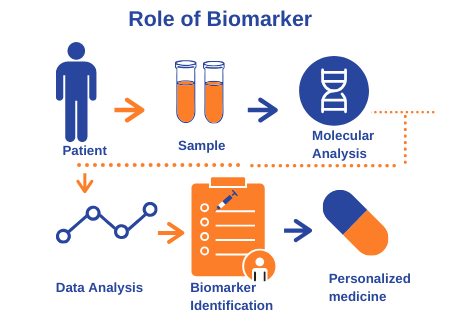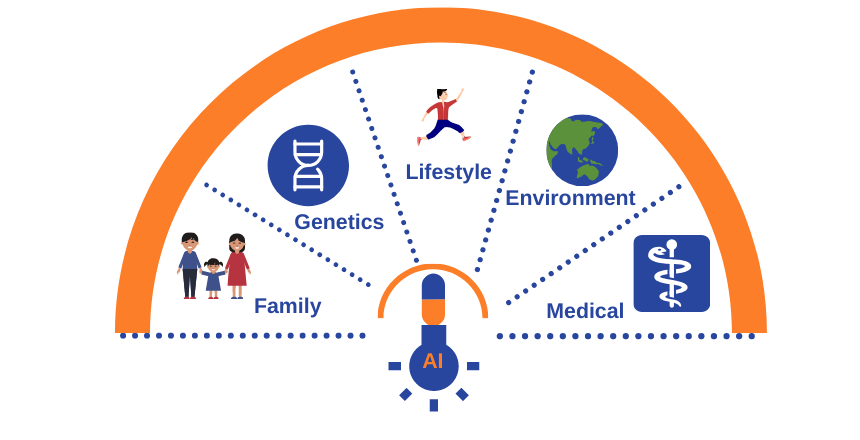Traditionally, the healthcare industry administers medication that could be common across several patients who are suffering with similar diseases. It is like a one-size-fits-all approach! With the advent of Artificial Intelligence, the healthcare industry has started an innovative idea to provide precision medicine – as opposed to similar medicine for all patients with similar ailments. The first step in providing personalized medicine is to identify biomarkers. The words precision medicine and personalized medicine are used synonymously in this article.
What is precision medicine?
Precision medicine is a new advanced approach to facilitate quality patient care based on each patient’s genetic, lifestyle and environment. It helps the doctors in providing quality treatment of the patient’s disease.
 To develop precision medicine the individual genetic information is needed. After collecting genetic information from individuals depending upon the molecular level (DNA, RNA, and Protein), the biologists can understand the cause behind the disease of individual patient. It also helps in developing precision medicine easily instead of trial and error medicine procedures.
To develop precision medicine the individual genetic information is needed. After collecting genetic information from individuals depending upon the molecular level (DNA, RNA, and Protein), the biologists can understand the cause behind the disease of individual patient. It also helps in developing precision medicine easily instead of trial and error medicine procedures.
Another clear application of Precision Medicine is Cancer. Over the past decade, doctors have given similar treatment to all cancer effected patients – independent of the growth of tumor. But,from several research findings, scientists have found that a patient’s tumor grows, spreads, and cures depending upon genetic changes in the patients. This means that the treatment for cancer cannot be the same for all the patients.
Precision medicine can facilitate personalized medicine not only for Cancer but also for other diseases.
According to a recent study of globenewswire.com, the precision medicine market is expected to reach around USD 86.25 billion by 2025, growing at a CAGR of around 10.1% between 2019 and 2025.
Biomarkers play an important role in developing precision medicine to diagnose diseases.
What is biomarker?
Biomarkers are playing a main role in identifying the right treatment process for the patients. Biomarker is a measurable indicator of patient disease stages. Doctors mostly depend upon the biomarkers to prepare the right medication treatment plan for the patients.
Biomarkers play multiple roles in curing the disease of patients by identifying the accurate stage of the disease as measured. They also encourage Doctors and Chemists to prepare precision medicine for the patients.
Biomarkers can be classified as:
Identify the disease as soon as possible. The diagnostic biomarker helps the doctors to confirm that the patients have particular health disorders.
Risk or Pre-Disposition biomarker
The risk stage of the patient while the disease is continuously increasing. The risk or pre-disposition biomarker helps the doctors to identify or suspect health disorders for particular patients in the near future.
Identifying the disease development. The prognostic biomarker helps the doctors to identify the possibility of recurrence of an already diagnosed disease. Take for example, breast cancer. In this case, the prognostic biomarker helps the doctors the most likely effect of breast cancer after taking initial treatment.
Identifying drug response from the patient. The predictive biomarkers can identify accurate treatment that is most likely to treat the patient and also provides information about how well the treatment is more likely to succeed for a particular patient.
Discovering suitable biomarkers to diagnose the stage of a certain disease involves substantial amount of manual work. The process of identifying the right biomarkers involves screening of tens and thousands of potential molecule candidates in patients. Artificial Intelligence algorithms could help in automating this manual discovery process.
AI in Biomarkers:
To prepare medicines and diagnose the diseases, physicians must have to identify a statistical difference between the healthy and diseased human beings to mark various stages.
Traditionally, physicians manually evaluate every biomarker to find whether the identified stage is accurate or not, thereby spending great amount of time in manual evaluation. Also, patients have to wait for further medication.
The role of biomarkers in precision medicine:
 Human diseases are complex with varying genetic, lifestyle and environmental factors. This means that the drug response should be different for patients even though they are suffering from the same disease – because of each genetic, lifestyle and environmental factors of each patient are different. In this case, providing a right drug for each patient at the right time is more important. The right drug development strategy for each patient can only be fulfilled by precision medicine, which will play a key role in diagnosing the patient’s diseases faster and accurately.
Human diseases are complex with varying genetic, lifestyle and environmental factors. This means that the drug response should be different for patients even though they are suffering from the same disease – because of each genetic, lifestyle and environmental factors of each patient are different. In this case, providing a right drug for each patient at the right time is more important. The right drug development strategy for each patient can only be fulfilled by precision medicine, which will play a key role in diagnosing the patient’s diseases faster and accurately.
To develop precision medicine, the need to identify various disease stages of the patients is facilitated by biomarkers. In this new era, biomarkers are mostly focused on genetics, specifically, they are molecules or genes or harmones. Further, Molecular diagnostics is a collection of techniques to analyse the biomarkers in the genes and proteins of bilological entities. This includes study of how the genes and proteins interact in the cell. These techniques are used to diagnose and monitor disease, identify risk, suggest which therapies are most suitable for individual patients.
The biomarkers are useful in clinical practice for:
- diagnosing and predicting the risk of patient’s diseases,
- identifying the signs of early-stage diseases from healthy human beings,
- deciding current treatment sufficient or not for the patients, and
- identifying specific target people who will help for a particular drug.
The clinical practice validation determines which biomarker is reliable, and provides an accurate measurement of disease stages.
To achieve precision medicine for each patient, the potential biomarkers need to be identified, verified and evaluated. This involves lots of manual work in evaluating potential biomarkers.
There is huge amount of data available in the healthcare industry regarding biomarkers. AI can collate this huge data and draw insights into which biomarker could provide accurate measurement.
Precision medicine facilitates personalized medicine for all based on a person’s genetic, lifestyle and environmental factors. Artificial intelligence can identify the potential biomarkers quickly and accurately to develop quality precision medicine.

